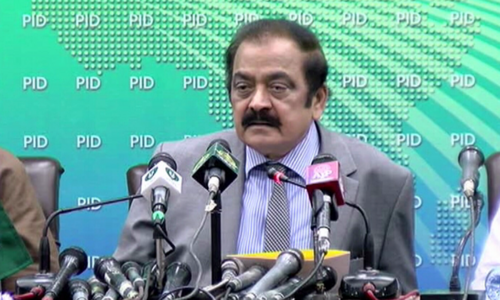KARACHI: The Sindh High Court (SHC) on Wednesday directed advocate general of Sindh to inform the court why detained leader of Pakistan Tehreek-i-Insaf Ali Amin Gandapur was not being released despite his having obtained bail in both the cases.
The bench, headed by Justice Omar Sial, also asked the AG, prosecutor general of Sindh and office of attorney general to put on record the details of all FIRs registered against the PTI leader till May 11.
When the bench took up a petition seeking details of cases lodged against Gandapur for hearing, the lawyer for the petitioner informed the court that two cases had been registered in Sindh, one each in Mithi and Shikarpur districts and the PTI leader had obtained bail in both cases.
However, the counsel argued, he was not being released from central prison Sukkur by the authorities concerned.
The bench issued notice to the provincial law officer and directed him to give reasons in his reply for not releasing the former federal minister.
Umer Amin Gandapur, a brother of the PTI leader, moved the SHC and contended that as per his information, a number of FIRs had been registered against his brother at Dera Ismail Khan, Islamabad and other cities of the country, including police stations in Sindh.
The petitioner argued that he could exercise his fundamental right to get copies of the FIRs registered against his brother, if any, and therefore, had approached the police authorities in Sindh but they were reluctant to provide any kind of information in this regard, which was tantamount to denying right to access justice and fundamental rights.
He asserted that Gandapur had falsely been implicated in a number of FIRs without any rhyme or reason by the present government and the PPP-led provincial government as they were bent upon unleashing political persecution against the PTI leader.
Gandapur was arrested at a court in D.I. Khan and was first shifted to Islamabad and then brought to Lahore and now he had been detained at central prison in Sukkur, he added.
The petitioner’s counsel contended that it was a settled principle of law that multiple FIRs under the same offence against a person could not be lodged, and was also against the principle of double jeopardy, but all the cases in question were registered against the former minister under the same charges while Section 123-A of Pakistan Penal Code was the prerogative of the state and could not be imposed by the police or a private person.
Published in Dawn, May 4th, 2023














































Dear visitor, the comments section is undergoing an overhaul and will return soon.